|
|
|
Sort Order |
|
|
|
Items / Page
|
|
|
|
|
|
|
| Srl | Item |
| 1 |
ID:
082805
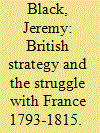

|
|
|
|
|
| Publication |
2008.
|
| Summary/Abstract |
This article examines the various constraints under which the conduct of British strategy operated during the French Wars - examples include its political and geographical situation, its far-flung colonial interests and its limited military resources and its need to maintain a strong alliance system in continental Europe - and shows how the direction that it took closely mirrored a variety of campaigns in the eighteenth century. That said, the position in which Britain found herself in the struggle against the French Revolution and Napoleon was frequently contradictory, and it is no coincidence that it was some time before the ideal combination of strategies was found that marked the period 1808-14. The fact that the difficulties involved were overcome said a great deal for the underlying strength of the British state.
|
|
|
|
|
|
|
|
|
|
|
|
|
|
|
|
| 2 |
ID:
082804
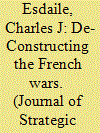

|
|
|
|
|
| Publication |
2008.
|
| Summary/Abstract |
The Emperor Napoleon I is regarded as one of the greatest generals of all time and, as such, he has attracted an immense bibliography. In spite of this, there have been few studies of him as a strategist: instead, it is simply assumed that it was enough for the Emperor to have conducted an operation for it to have had a logical strategic goal. In this article, however, Napoleon is shown to have been primarily an opportunist, who was frequently guided by the needs of the moment and swayed from his course by circumstance, while it is further suggested that, even considered on their own merits, many of his decisions were faulty in the extreme
|
|
|
|
|
|
|
|
|
|
|
|
|
|
|
|
| 3 |
ID:
101879
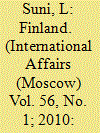

|
|
|
|
|
| Publication |
2010.
|
| Summary/Abstract |
EVERYTHING THAT HAPPENED 200 years ago the war of 1808-1809 and the joining of Finland to Russia were caused by the political and international processes triggered by the French Revolution and Napoleonic Wars.
|
|
|
|
|
|
|
|
|
|
|
|
|
|
|
|
| 4 |
ID:
111949
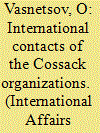

|
|
|
|
|
| Publication |
2012.
|
| Summary/Abstract |
AT ALL TIMES, the Cossacks have been and remain an inalienable part of the Russian state, its history, culture and spiritual values. Since time immemorial, the Cossacks preserved and multiplied their glorious traditions: patriotism, courage, and faith in God and the Russian people.
Leo Tolstoy said in his time that the entire history of Russia had been made by the Cossacks. It was thanks to their efforts that the state was spreading far and wide; they came to the newly acquired lands to settle them and start new towns; they protected the borders against numerous enemies of Russia's. Their foreign marches fortified Russia's international positions; the glory of the Cossacks and their valor echoed in Paris, Persia and in the Balkans.
|
|
|
|
|
|
|
|
|
|
|
|
|
|
|
|
| 5 |
ID:
082806
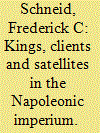

|
|
|
|
|
| Publication |
2008.
|
| Summary/Abstract |
Napoleon shaped his Empire with the expansion of dynastic possessions, the cultivation of princely clientele and the establishment of satellite and allied states. He built his imperium on the foundation of historic French relationships. This expansion began with the Revolutionary Republic and achieved its fullest extent under the Empire. Expansion was not pursued as a universal principle, but instead, each state became a part of a grand strategic objective related to respective enemies. In some cases, states served as buffers between France and their immediate enemies, but shortly thereafter served a dual role as offensive and defensive components of the Republic, and later Napoleonic Empire.
|
|
|
|
|
|
|
|
|
|
|
|
|
|
|
|
| 6 |
ID:
040849


|
|
|
|
|
| Publication |
London, Oxford University Press, 1970.
|
| Description |
xiv, 402p.: ill.Hbk
|
| Standard Number |
192151843
|
|
|
|
|
|
|
|
|
|
|
|
Copies: C:1/I:0,R:0,Q:0
Circulation
| Accession# | Call# | Current Location | Status | Policy | Location |
| 007191 | 944.035/LEA 007191 | Main | On Shelf | General | |
|
|
|
|
| 7 |
ID:
117172
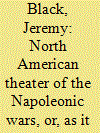

|
|
|
| 8 |
ID:
131404


|
|
|
|
|
| Publication |
2014.
|
| Summary/Abstract |
This article examines the ill-fated Russian expedition to conquer British India in 1801 with a Cossack host via Central Asia. Undertaken by Emperor Paul I during his brief diplomatic dalliance with Napoleon, the enterprise proved highly unrealistic and was abandoned less than a month after it began. I pay special attention to the knowledge that officials in Saint Petersburg had about the regions to be traversed. I conclude that, despite British fears of a tsarist overland invasion of their South Asian possessions during much of the nineteenth century, this poorly planned mission was the only Russian attempt ever made.
|
|
|
|
|
|
|
|
|
|
|
|
|
|
|
|
| 9 |
ID:
131429
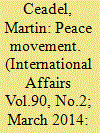

|
|
|
|
|
| Publication |
2014.
|
| Summary/Abstract |
The First World War led to the reconstruction and reinvigoration of the British peace movement, which steadily increased in activity and impact from 1914 until the end of the 1930s. This article defines the movement, explains why it emerged first and developed most influentially in Britain, and outlines the various phases of its history from the 1790s until the present day. It concentrates on the less well known phases of the movement's history: its origins during the French Revolutionary and Napoleonic Wars and on its moments of political significance during the nineteenth century. It says less about the post-1945 movement, which readers of International Affairs will be more familiar with, though it makes the point that 'peace' is currently being trumped as the primary political goal of most progressives by 'human rights', which can be invoked to justify military intervention.
|
|
|
|
|
|
|
|
|
|
|
|
|
|
|
|
| 10 |
ID:
117168


|
|
|
| 11 |
ID:
082807


|
|
|
|
|
| Publication |
2008.
|
| Summary/Abstract |
This essay re-examines coalition warfare during the Napoleonic era by looking at the three eastern European powers - Austria, Prussia and Russia - how they interacted over time with France as well as each other, and how they managed French preponderance on the Continent. Before 1812, coalition warfare was dominated by eighteenth-century military and diplomatic attitudes: overall foreign political goals were ill-defined and were characterised by deep mistrust. The result was that the eastern powers pursued their own interests with little regard to coalition cohesion. If the coalition held together in 1813 and 1814, on the other hand, it was largely because individual powers' self-interest coincided with the overall objectives of the coalition - an increased determination to defeat Napoleon - along with a never before seen numerical superiority in allied troops. In this, Austria and especially Chancellor Metternich's role in juggling conflicting interests between the allies so that they could present, for the first time, a united front against France was fundamental.
|
|
|
|
|
|
|
|
|
|
|
|
|
|
|
|
| 12 |
ID:
109543
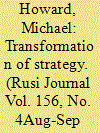

|
|
|
| 13 |
ID:
117173


|
|
|
| 14 |
ID:
139334


|
|
|
|
|
| Summary/Abstract |
By bringing the Napoleonic Wars to an end, the Battle of Waterloo gave the last impetus to an ongoing upheaval that, in little over a decade, dislocated a centuries-old global Iberian world. To a limited extent, it also contributed to the unleashing of an era of civil war that resulted in the secession of most of the Spanish American dominions and fuelled the ideological battleground between conservative and progressive, centralist and decentralist forces. Portugal fared no better, troubled by domestic crises and the eventual unravelling of the Lusitanian Empire through the emergence of an independent Brazil.
|
|
|
|
|
|
|
|
|
|
|
|
|
|
|
|
| 15 |
ID:
073529


|
|
|
|
|
| Publication |
2006.
|
| Summary/Abstract |
Wellington's use of intelligence developed throughout his military career. Arguably, his experiences in India taught him the importance of intelligence, but it was during the Peninsular War that he honed his analytical techniques. As the war progressed, he developed sophisticated methods for the integration of strategic intelligence - largely gathered by civilian agents - with operational intelligence - collected by military personnel. This allowed him to develop operational conceptualisation, which in turn contributed to the successes he achieved over the French forces in Iberia. However, more than anything, it was his considered use of intelligence, combined with intricate deception operations in the latter stages of the conflict, which deprived the French of reliable intelligence on his own movements, and demonstrated his understanding of the importance of intelligence. This article investigates Wellington's increasing awareness of the importance of intelligence and deception during the Peninsular War.
|
|
|
|
|
|
|
|
|
|
|
|
|
|
|
|
| 16 |
ID:
131447
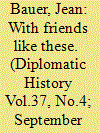

|
|
|
|
|
| Publication |
2013.
|
| Summary/Abstract |
In the summer of 1780, John Adams and the Comte de Vergennes crossed epistolary swords over America's status in the Franco-American Alliance. Understanding their irreconcilable policies explains how a minor dispute about paper money erupted into a fight over the control of post-war American commerce, which became a battle over the proper deployment of the French Navy in the New World, which led to mutual accusations of betrayal and treason. France thought the United States was its client state, bound to assist France against its enemies, particularly Great Britain. At the same time, American politicians followed the logic of the Model Treaty and "free ships make free goods" to claim America as a neutral state, free to sell its staple agricultural products to whomever offered the best price, including Britain. This difference underlies all the major conflicts of Franco-American relations through the end of the Napoleonic Wars.
|
|
|
|
|
|
|
|
|
|
|
|
|
|
|
|
|
|
|
|
|